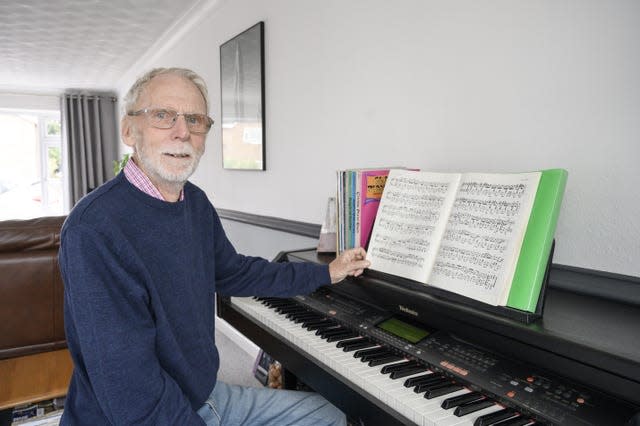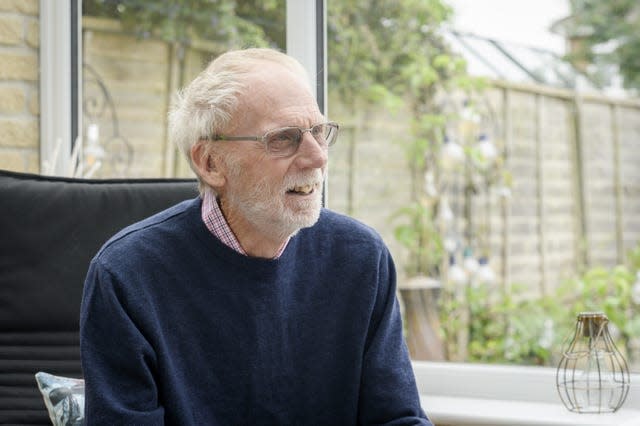Retired teacher ‘waited 18 hours to be seen for heart attack’
A retired teacher has told how he waited 18 hours to be treated in hospital for a heart attack.
Glynn Evans, 76, started to get an indigestion-like pain in his chest while on holiday with his family in Bodmin, Cornwall, in 2022.
He said he was not worried at first, but by around 8pm that evening, he and his wife Lyn knew something was seriously wrong. She rang 999.
Mr Evans, from Bourne in Lincolnshire, who is now fronting a British Heart Foundation campaign, said: “My son-in-law was going to take me to hospital, but said the last thing he wanted was for me to keel over in the back of his car.
“So, we waited for the ambulance. It eventually turned up the next morning.”

Mr Evans said that when he finally got to the Royal Cornwall Hospital in Truro, there were 24 ambulances in the queue ahead of him.
The grandfather of six added: “I stayed in the ambulance and a doctor had to come out to me to do a blood test.
“He came back later and told me that it wasn’t good news – I’d had a heart attack.”
Mr Evans was finally seen in hospital around 2pm, around 18 hours after his wife first called 999.
Each week, around 12 young people are lost to sudden cardiac death in the UK. Their hopes and dreams lost in an instant.
This summer, we’re honouring 12 young people who have passed away in a series of murals across the UK.
More here: https://t.co/nDh3xvWoBE pic.twitter.com/rvFiX9kNYX
— British Heart Foundation (@TheBHF) June 6, 2024
The British Heart Foundation (BHF) has launched a new campaign – Hearts Need More – to fix what it says is “the worst heart care crisis in living memory”.
Mr Evans, who now lives with heart failure, said: “The doctor who treated me was furious that I had to wait so long.
“I’m not sure my heart failure would be quite as bad if it hadn’t taken so long to treat me.
“There’s nothing that anyone can do about my long wait now. But I don’t want anyone else to have to wait that long and miss out on the best available treatment. That’s why I’m supporting the BHF’s Hearts Need More campaign.”
All ambulance trusts should respond to Category 2 calls – including heart attacks – in 18 minutes on average.

In January 2023, an additional target was added to respond to Category 2 calls in 30 minutes on average for 2023/24.
During 2023/24, the average response time for Category 2 calls was above this, at 36 minutes 15 seconds.
As part of its campaign, the British Heart Foundation has launched an online pledge calling for the Government to create a heart disease action plan.
More than 40,000 people have signed so far and the charity is hoping for 50,000 signatures.
Chief executive Dr Charmaine Griffiths said: “Glynn’s story makes it clear: we’re in the grip of the worst heart care crisis the country has ever faced.
“What happened to Glynn was unacceptable, and it wasn’t just a one-off.
“At the BHF, we get calls almost every day from people who have gone through stressful and often dangerous waits for heart tests, treatment, or even emergency care.
“Long waits for heart care put lives on the line. For the first time on record, we’re seeing a sustained rise in early heart and circulatory disease deaths. That means thousands more families ripped apart.
“Our new Government has the power to stop this ongoing tragedy once and for all, but it will take everyone’s help.
“Please sign your name to show our new Prime Minister that heart patients can’t wait any longer for a future free from pain and heartbreak.”
Latest figures for 2022 show that an average of 750 people a week aged 75 or under died from cardiovascular disease in England – the highest annual total since 2008.
A spokesperson for Cornwall and Isles of Scilly Integrated Care System said: “We are sorry that we were unable to provide Mr Evans a timely response in 2022. Any occasion where the care we provide falls below the high standards our patients deserve and rightly expect is unacceptable.
“Thanks to the hard work and dedication of our people and partners, our response times have recovered to a more stable position, compared to 2022, but there is still more to do.
“Our staff are working tirelessly to avoid delays in ambulances being able to hand over the care of their patients, which is the result of pressure not only on the main emergency department, but across the entire health and care system.
“That’s why we’re providing more care and treatment in people’s homes or in their local community so we can free up our hospitals to admit the most acutely unwell or injured more quickly.”

 Yahoo News
Yahoo News 
